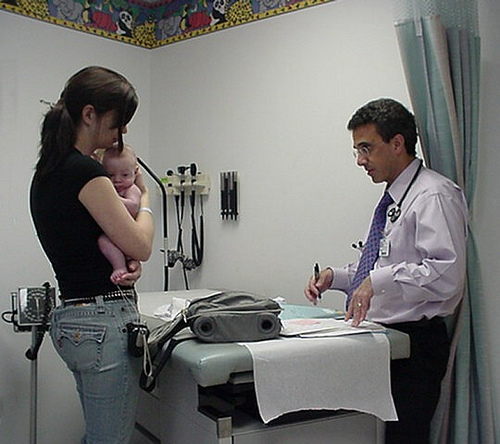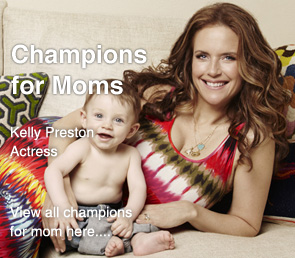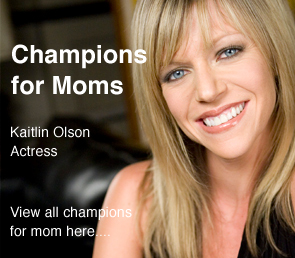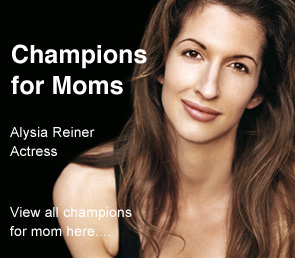 The Joint Commission is a non-profit organization that accredits and certifies many healthcare organizations and programs in the US, and fear of losing that approval is a very real thing, says Tanya, at Motherwear’s blog.
The Joint Commission is a non-profit organization that accredits and certifies many healthcare organizations and programs in the US, and fear of losing that approval is a very real thing, says Tanya, at Motherwear’s blog.
Their campaign “Speak Up™” encourages people, from children to elderly, to be an active partner in their health care. Asking questions, having your own opinions, making sure you understand everything done to you and suggested to you and why.
For breastfeeding Babes, they’ve also created a brochure for their new campaign called “What You Need To Know About Breastfeeding” that says that if you intend on breastfeeding, you need to be proactive. But what exactly does that mean?
We share author Tanya’s opinion that while being proactive is fantastic, they’re putting the responsibility on the wrong people. Their big focus should be getting the medical model back to evidence-based breastfeeding support. However, since we’re not there yet, we do need to learn to speak up for ourselves (we know that can be uncomfortable for some Babes). Here are some of the best ways to be prepared, educated, and empowered when it comes to medical professionals and breastfeeding support:
- Arm yourself with knowledge. Learn everything you can about breastfeeding and get up to speed on the Booby Traps before they have the chance to trip you up. Make a bookmark folder on your browser called “Breastfeeding” and start saving things there to reference. Print out things you find very important or relevant, and take them with you to appointments. Often, being able to put the onus of your argument on a third-party source can really help deflect conflict. For example, for a mom who is being told “There’s no benefit to breastfeeding after the first birthday,” a simple print out of the World Health Organization’s recommendation to breastfeed to two and beyond can help educate a doctor who’s not in-the-know… or it may at least get them to back off of suggestions to wean your baby. Keep in mind, according to the Surgeon General, there aren’t human lactation courses for many medical professionals right now unless they seek them out themselves separate from their required medical courses — which leaves most doctors out of the loop on breastfeeding info.
- Let your doctor know your goals. When you first meet your OB, your pediatrician, or any doctor, discuss with them who you are, and your goals. Ideally, you want to find a doctor whose style is compatible with your goals and your parenting choices. Taking the time to discuss things like your breastfeeding goals from the get-go can set the stage for success (or signal you to seek out a different practitioner).
- Change things, or try. Work with your doctor to make evidence-based info on breastfeeding the standard of care in their practice. Refer them to the Academy of Breastfeeding Medicine, which has all the resources and clinical protocols they’ll need to give moms the best, most current and evidence-based advice possible.
How do you handle advocating for yourself? What would you recommend women do?
 |
 |
Brought to you by A Mother’s Boutique and Hot Mama Gowns!
image credit: Era Phernalia Vintage/Flickr
 Christie Haskell is a coffee and tea-addicted wife to Kyle and mother of two wee beasties — Rowan (7) and Aurora the Destroyer (2) and one fur baby, Isis. She’s a true geek at heart and spends too much time playing video games and reading fantasy novels when she’s not typing her fingers off for CafeMom’s The Stir or her personal blog-love, DailyMomtra.
Christie Haskell is a coffee and tea-addicted wife to Kyle and mother of two wee beasties — Rowan (7) and Aurora the Destroyer (2) and one fur baby, Isis. She’s a true geek at heart and spends too much time playing video games and reading fantasy novels when she’s not typing her fingers off for CafeMom’s The Stir or her personal blog-love, DailyMomtra.















I also urge women to read a comprehensive book about birth, such as “The Birth Book” by William and Martha Sears. So many things about labor & delivery affect breastfeeding, and most moms aren’t well informed about the risks of the procedures that are routine in hospitals (continuous fetal monitoring, IV fluids, epidurals, laboring in bed, etc.) At least if you’ve read about it then you can have an honest discussion with your healthcare provider and give yourself a much better shot at having the labor & birth experience you want.